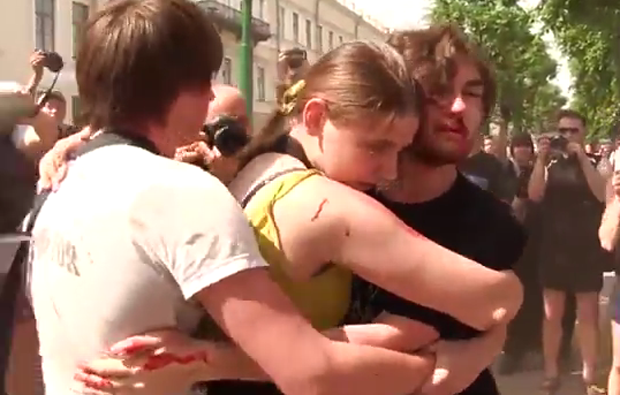Human Rights Watch released a video documenting the treatment of LGBT Russians on 3 February ahead of the opening of the Sochi Winter Olympics.
Drawing a screen around the realities of life for Russian gays and lesbians, Russian president Vladimir Putin and the organizers of the Sochi Winter Olympic games are presenting a decidedly friendly face to international visitors.
Even though Sochi’s mayor, Anatoly Pakhomov, would prefer to believe “there are no gays” in his city, the mayor of the Olympic village, Elena Isinbayeva, offered to make LGBT athletes to feel welcome — despite her earlier homophobic comments. The girl band Tatu, most popular during the early 2000s when they exploited homoeroticism in their live appearances and videos, will perform at the opening ceremonies.
The real Russia has turned ugly and brutish toward its LGBT citizens.
The recent spate of homophobic violence has its roots in a controversial law that bars the promotion of non-traditional relationships as being equal to traditional relationships. While the law’s backers say they are protecting children, the effect has been to silence the push for gay rights by threatening fines for “homosexual propaganda.”
While official Russia will be demonstrating what it sees as tolerance in Sochi, a court in the city of Nizhniy Tagil will issue a ruling on the case of Elena Klimova – a young journalist who created a group on Vkontakte – Russia’s answer to Facebook. Klimova’s group, Children 404, contains letters from young LGBT people, who have been subject to physical and psychological attacks. Their letters to each other, according to Klimova, have been helping them cope with the pressure and continuing struggle for their rights. Klimova’s efforts to ease the isolation of LGBT children has drawn the ire of United Russia’s Vitaly Milonov, a proponent of the gay propaganda law, who has sued Madonna and been exposed as a bigot by Stephen Fry.
Klimova has also been active in raising concerns about the plight of a teen girl in the Bryansk region who has been put under administrative control by a local juvenile commission. Her crime? The girl openly identified “herself as a person with non-traditional sexual orientation and promote[d] information which misinforms minors about social equality of traditional and non-traditional relationship”. She will be monitored as if she were a criminal.
According to the latest Levada-Centre research, some 43% of Russian citizens consider homosexuality a bad habit, 38% reckon LGBT people should be “cured”, 47% say LGBT and heterosexuals are not socially equal and 73% approve the state’s effort to prevent public professions of an LGBT orientation.
The Russian Orthodox Church has done a lot to maintain these numbers.
Patriarch Kirill has repeatedly condemned equal marriage, saying in late January that marriage is “between a man and a woman, based on love, aimed at having children”. Kirill asked law makers to reflect his belief in drafting laws. Moscow Patriarchate’s spokesman Vladimir Legoida called equal marriage and homosexuality a sin in an interview to RIA-Novosti – the former Russian state news agency. Not to be outdone, Ivan Okhlobystin, an actor and former priest, said “gays should be burnt in ovens”.
In the meantime, on 3 February, the regional court of Kamchatka sentenced three people to 9-12 years in prison for the murder of a gay acquaintance.
Homosexuality was decriminalized in Russia in 1993. In 1999 it finally was excluded from Russian official list of mental illnesses. The change in people’s mind is still yet to come.
This article was originally published on 6 February 2014 at indexoncensorship.org





